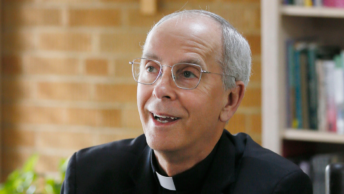 On this Third Sunday of Lent, we hear a very curious Gospel passage: Pilate mingles the blood of the Galileans with their sacrifices and a falling tower kills 18 people. Obviously, these were pressing news items in Jesus’ day. Like tragedies of today such as tsunamis and earthquakes or terrorist activities, the people of 2000 years ago wanted a spiritual explanation. Why does God allow evil to occur? Jesus used these incidents as a teaching moment to remind his listeners that they can learn from those experiences in order to be converted from their sinful ways.
On this Third Sunday of Lent, we hear a very curious Gospel passage: Pilate mingles the blood of the Galileans with their sacrifices and a falling tower kills 18 people. Obviously, these were pressing news items in Jesus’ day. Like tragedies of today such as tsunamis and earthquakes or terrorist activities, the people of 2000 years ago wanted a spiritual explanation. Why does God allow evil to occur? Jesus used these incidents as a teaching moment to remind his listeners that they can learn from those experiences in order to be converted from their sinful ways.
In other words, God is not capricious. God does not “zap” people in order to punish them. Rather, because of human free will and intellect, evil situations sometimes occur. What can we learn from them? These experiences happen, not because of God’s will, but because of human activity. When they do occur they should serve as a warning to us. If we repeatedly disobey God’s commands, if we freely choose to do evil and commit sin, if we continually ignore our responsibility as Christians, we will suffer the consequences.
Lent affords us the opportunity to ask ourselves: “Have we been too complacent in living out our Christian lives? Do we take God’s gifts for granted? Do we presume too much on God’s mercy and forgiveness?” As the last line of this Sunday’s reading from Corinthians reminds us, “Whoever thinks he is standing secure should take care not to fall.”
May the remaining weeks of Lent challenge us to become more active in our faith in order to grow into the persons God is calling us to be.








